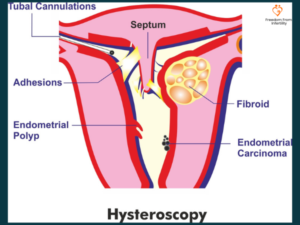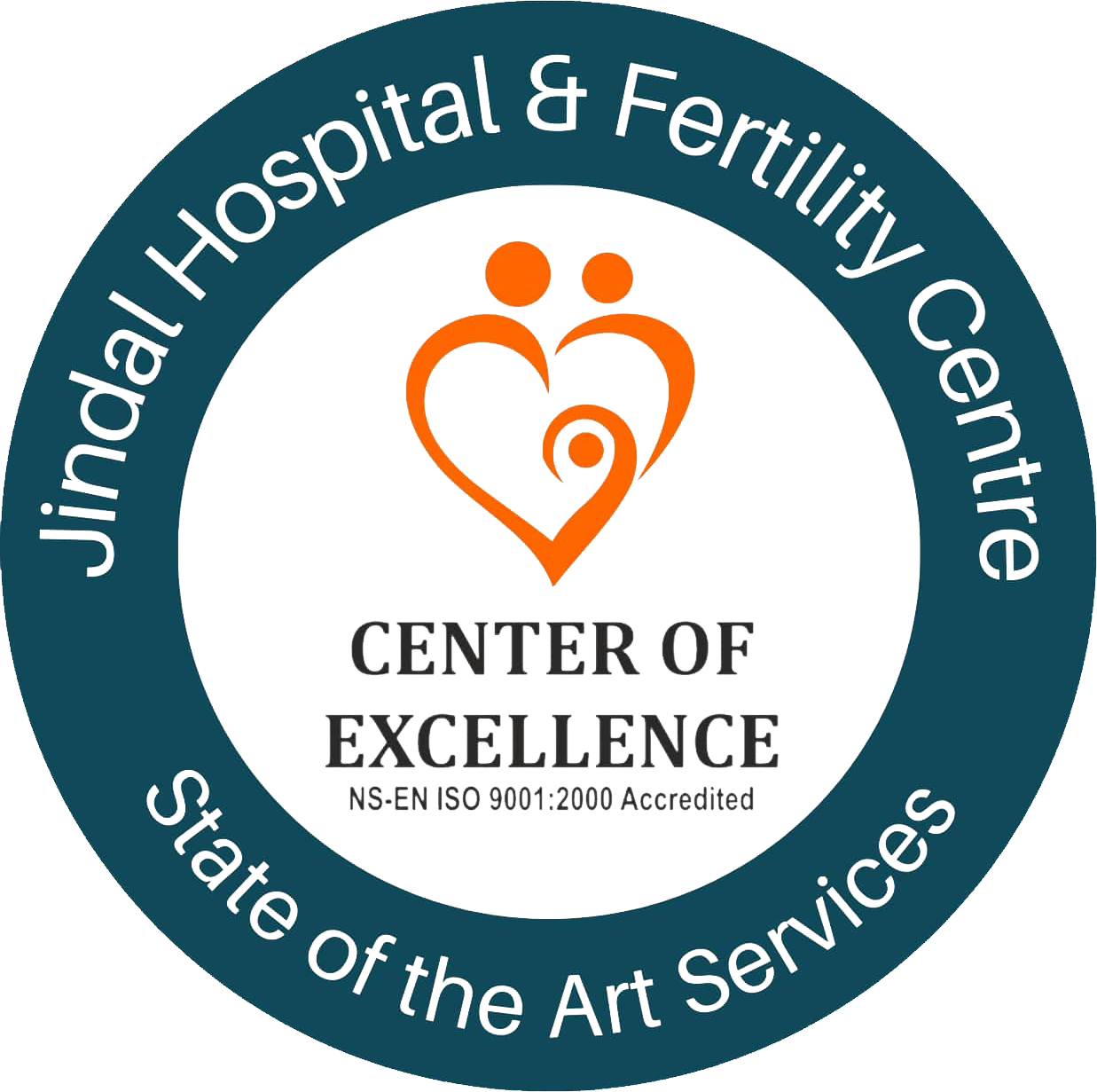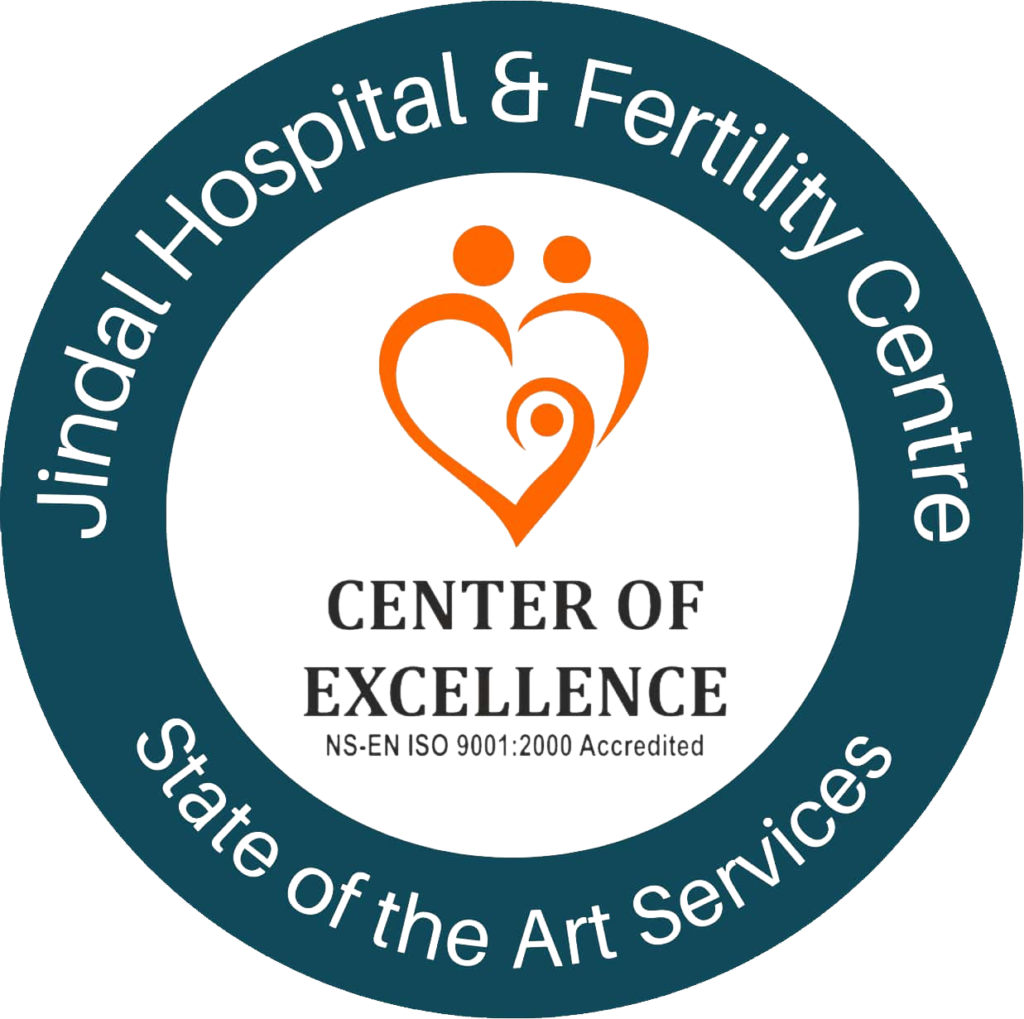
Overview
Hysteroscopy Procedure
Why choose us
Do's & Don'ts
FAQs
Overview
 Introduction
Introduction
Welcome to our comprehensive guide on the Best Hysteroscopy services offered at Jindal Hospital & Fertility Centre in Delhi, India. we are committed to providing detailed insights into this essential procedure in women’s health. Led by renowned doctors, Dr. Sunil Jindal and Dr. Anshu Jindal, our hospital stands as a beacon of excellence in hysteroscopy. In this guide, we delve deep into the world of hysteroscopy, its benefits, the procedure at our facility, and what sets us apart as the best choice for your healthcare needs.
Understanding Hysteroscopy
Hysteroscopy is a minimally invasive procedure used to examine the inside of the uterus. At Jindal Hospital & Fertility Centre, we offer the best hysteroscopy in Meerut & Delhi, India, providing patients with accurate diagnosis and effective treatment options for various uterine conditions.
Types of Hysteroscopy
- Diagnostic Hysteroscopy: Our expert team, led by Dr. Sunil Jindal and Dr. Anshu Jindal, uses diagnostic hysteroscopy to investigate the cause of abnormal bleeding, recurrent miscarriages, or unexplained pelvic pain.
- Operative Hysteroscopy: For treatments such as the removal of polyps, fibroids, or correction of uterine septums, our skilled surgeons perform operative hysteroscopy with precision and expertise.
- Expert Doctors
- State-of-the-Art Facilities
- Personalized Care
- Minimally Invasive Procedures
The Hysteroscopy Procedure at Jindal Hospital & Fertility Centre
Pre-Procedure Preparation
Before your hysteroscopy procedure at Jindal Hospital & Fertility Centre, our team will guide you through the necessary preparations. This may include fasting for a few hours and discussing any medications you are currently taking.
During the Procedure
- Anesthesia: Depending on your comfort and the type of hysteroscopy, you may receive local anesthesia or be sedated for the procedure.
- Insertion of Hysteroscope: The skilled team of doctors will gently insert the hysteroscope into your uterus through the cervix. This allows for a clear view of the uterine lining.
- Examination or Treatment: Dr. Sunil Jindal and Dr. Anshu Jindal will carefully examine your uterus for any abnormalities or perform necessary treatments with precision and expertise.
After the Procedure After your hysteroscopy, you may experience mild cramping or spotting, which is normal. Our team will provide detailed post-procedure instructions to ensure your comfort and well-being during the recovery period.
Conditions Diagnosed and Treated
Conditions Diagnosed:
- Abnormal Uterine Bleeding
- Recurrent Miscarriages
- Pelvic Pain
- Uterine Polyps
- Fibroids
- Uterine Septum
- Endometrial Hyperplasia
- Asherman’s Syndrome
- Best Hysteroscopy in Meerut, Delhi, India: Our hospital is renowned for providing the best hysteroscopy services in Meerut, Delhi, India, thanks to the expertise of Dr. Sunil Jindal and Dr. Anshu Jindal.
- Renowned Doctors: Dr. Sunil Jindal and Dr. Anshu Jindal are recognized for their contributions to the field of hysteroscopy, both nationally and internationally.
- Patient-Centric Approach: At Jindal Hospital & Fertility Centre, patients are at the heart of everything we do. Your comfort, well-being, and satisfaction are our top priorities.
- Affordable Excellence: We believe that quality healthcare should be accessible to all. Our hysteroscopy services combine excellence with affordability.
Hysteroscopy is recommended for a variety of uterine conditions, with indications including:
- Abnormal Uterine Bleeding
- If you experience irregular, heavy, or prolonged periods, hysteroscopy can help identify the underlying cause. This may include conditions such as uterine polyps, fibroids, or hormonal imbalances.
- Recurrent Miscarriages
- Women who have experienced multiple miscarriages may undergo hysteroscopy to assess the uterine cavity for abnormalities that could be contributing to pregnancy loss.
- Unexplained Pelvic Pain
- Chronic pelvic pain without a clear cause can be frustrating. Hysteroscopy allows doctors to examine the uterine lining for signs of inflammation, adhesions, or other issues.
- Infertility Investigations
- For couples struggling with infertility, hysteroscopy is often part of the diagnostic process. It helps identify uterine abnormalities such as a uterine septum or adhesions that could hinder conception.
- Evaluation of Abnormal Pap Smear Results
- If you receive abnormal Pap smear results, further investigation with hysteroscopy may be necessary to examine the cervical canal and uterine cavity for signs of abnormalities or precancerous cells.
- Accurate Diagnosis
- Hysteroscopy offers a direct, visual examination of the uterine cavity, allowing for precise diagnosis of various conditions.
- Minimally Invasive
- Compared to traditional open surgeries, hysteroscopy is minimally invasive, resulting in less pain, shorter recovery times, and reduced risk of complications.
- Customized Treatment Plans
- Once a diagnosis is made, hysteroscopy allows for tailored treatment plans. Procedures such as polyp removal, fibroid resection, or uterine septum correction can be performed during the same procedure.
- Comprehensive Evaluation
- Hysteroscopy provides a thorough evaluation of the entire uterine cavity, ensuring that even small abnormalities are detected and addressed.
- Outpatient Procedure
- In many cases, hysteroscopy can be performed as an outpatient procedure, allowing patients to return home the same day.
- Early Detection of Conditions
- Early detection of uterine conditions such as polyps, fibroids, or abnormal growths allows for prompt treatment and better outcomes.
- Improved Fertility
- By identifying and treating factors contributing to infertility, such as a uterine septum or adhesions, hysteroscopy can improve a woman’s chances of conceiving.
- Prevention of Complications
- Addressing uterine abnormalities through hysteroscopy can prevent complications such as heavy bleeding, pelvic pain, or recurrent miscarriages.
- Quality of Life
- Resolving uterine issues with hysteroscopy can significantly improve a woman’s quality of life, alleviating symptoms and restoring normal menstrual cycles.
In conclusion, hysteroscopy is a valuable tool in women’s healthcare, offering precise diagnosis and effective treatment for a range of uterine conditions. From its indications in cases of abnormal bleeding, recurrent miscarriages, infertility investigations, and more, hysteroscopy plays a crucial role in ensuring optimal reproductive health. At Jindal Hospital & Fertility Centre we are committed to providing the highest quality of care for our patients. Led by esteemed doctors Dr. Sunil Jindal and Dr. Anshu Jindal, our expertise in hysteroscopy ensures that you receive personalized treatment plans tailored to your needs. If you are experiencing any symptoms or have concerns about your reproductive health, consider the benefits of hysteroscopy. Contact us today to schedule a consultation and take the first step towards a healthier, happier you.
Hysteroscopy Procedure
What Sets Jindal Hospital & Fertility Centre Apart
Conclusion
In conclusion, if you are seeking the best hysteroscopy in Meerut, Delhi, India, look no further than Jindal Hospital & Fertility Centre. Led by the renowned expertise of Dr. Sunil Jindal and Dr. Anshu Jindal, our hospital offers state-of-the-art facilities, personalized care, and effective treatment options for various uterine conditions. For more information or to schedule a consultation, contact us today.
- Best Hysteroscopy in Meerut, Delhi, India: Our hospital is renowned for providing the best hysteroscopy services in Meerut, Delhi, India, thanks to the expertise of Dr. Sunil Jindal and Dr. Anshu Jindal.
- Renowned Doctors: Dr. Sunil Jindal and Dr. Anshu Jindal are recognized for their contributions to the field of hysteroscopy, both nationally and internationally.
- Patient-Centric Approach: At Jindal Hospital & Fertility Centre, patients are at the heart of everything we do. Your comfort, well-being, and satisfaction are our top priorities.
- Affordable Excellence: We believe that quality healthcare should be accessible to all. Our hysteroscopy services combine excellence with affordability.
Conclusion
In conclusion, if you are seeking the best hysteroscopy in Meerut, Delhi, India, look no further than Jindal Hospital & Fertility Centre. Led by the renowned expertise of Dr. Sunil Jindal and Dr. Anshu Jindal, our hospital offers state-of-the-art facilities, personalized care, and effective treatment options for various uterine conditions. For more information or to schedule a consultation, contact us today.
Why choose us
Benefits of Hysteroscopy
Importance of Hysteroscopy
Conclusion
In conclusion, hysteroscopy is a valuable tool in women’s healthcare, offering precise diagnosis and effective treatment for a range of uterine conditions. From its indications in cases of abnormal bleeding, recurrent miscarriages, infertility investigations, and more, hysteroscopy plays a crucial role in ensuring optimal reproductive health.
At Jindal Hospital & Fertility Centre we are committed to providing the highest quality of care for our patients. Led by esteemed doctors Dr. Sunil Jindal and Dr. Anshu Jindal, our expertise in hysteroscopy ensures that you receive personalized treatment plans tailored to your needs.
If you are experiencing any symptoms or have concerns about your reproductive health, consider the benefits of hysteroscopy. Contact us today to schedule a consultation and take the first step towards a healthier, happier you.
- Accurate Diagnosis
- Hysteroscopy offers a direct, visual examination of the uterine cavity, allowing for precise diagnosis of various conditions.
- Minimally Invasive
- Compared to traditional open surgeries, hysteroscopy is minimally invasive, resulting in less pain, shorter recovery times, and reduced risk of complications.
- Customized Treatment Plans
- Once a diagnosis is made, hysteroscopy allows for tailored treatment plans. Procedures such as polyp removal, fibroid resection, or uterine septum correction can be performed during the same procedure.
- Comprehensive Evaluation
- Hysteroscopy provides a thorough evaluation of the entire uterine cavity, ensuring that even small abnormalities are detected and addressed.
- Outpatient Procedure
- In many cases, hysteroscopy can be performed as an outpatient procedure, allowing patients to return home the same day.
Importance of Hysteroscopy
- Early Detection of Conditions
- Early detection of uterine conditions such as polyps, fibroids, or abnormal growths allows for prompt treatment and better outcomes.
- Improved Fertility
- By identifying and treating factors contributing to infertility, such as a uterine septum or adhesions, hysteroscopy can improve a woman’s chances of conceiving.
- Prevention of Complications
- Addressing uterine abnormalities through hysteroscopy can prevent complications such as heavy bleeding, pelvic pain, or recurrent miscarriages.
- Quality of Life
- Resolving uterine issues with hysteroscopy can significantly improve a woman’s quality of life, alleviating symptoms and restoring normal menstrual cycles.
Conclusion
In conclusion, hysteroscopy is a valuable tool in women’s healthcare, offering precise diagnosis and effective treatment for a range of uterine conditions. From its indications in cases of abnormal bleeding, recurrent miscarriages, infertility investigations, and more, hysteroscopy plays a crucial role in ensuring optimal reproductive health.
At Jindal Hospital & Fertility Centre we are committed to providing the highest quality of care for our patients. Led by esteemed doctors Dr. Sunil Jindal and Dr. Anshu Jindal, our expertise in hysteroscopy ensures that you receive personalized treatment plans tailored to your needs.
If you are experiencing any symptoms or have concerns about your reproductive health, consider the benefits of hysteroscopy. Contact us today to schedule a consultation and take the first step towards a healthier, happier you.
Do's & Don'ts
The Do’s of Hysteroscopy
- Follow Pre-Procedure Instructions
- Adhere to any pre-procedure instructions provided by your healthcare provider. This may include fasting for a certain period before the procedure or taking medications as directed.
- Arrange for Transportation
- Arrange for someone to drive you home after the procedure. While hysteroscopy is generally an outpatient procedure, you may feel drowsy or lightheaded afterward due to anesthesia or sedation.
- Stay Hydrated
- Drink plenty of water leading up to the procedure. Hydration helps maintain good blood flow and can make it easier to find veins for IV insertion if needed.
- Wear Comfortable Clothing
- Opt for loose, comfortable clothing on the day of your hysteroscopy. This will ensure you feel at ease during the procedure and afterward.
- Ask Questions
- If you have any concerns or questions about the hysteroscopy procedure, do not hesitate to ask your healthcare provider. Understanding the process can alleviate anxiety and help you prepare better.
- Arrange for Post-Procedure Rest
- Plan to take it easy after the procedure. Resting at home for the remainder of the day is often recommended to allow your body to recover.
- Follow Post-Procedure Care Instructions
- Follow any post-procedure care instructions provided by your doctor. This may include avoiding strenuous activities, refraining from sexual intercourse for a certain period, or taking prescribed medications.
The Don’ts of Hysteroscopy
- Don’t Eat or Drink Before Anesthesia
- As per your doctor’s instructions, avoid eating or drinking for the specified amount of time before the procedure. Anesthesia can cause nausea if the stomach is not empty.
- Don’t Drive Yourself Home
- It is not safe to drive yourself home after hysteroscopy, especially if you have been given sedation or anesthesia. Make arrangements for someone to accompany you.
- Don’t Ignore Abnormal Symptoms
- If you experience severe pain, heavy bleeding, fever, or unusual symptoms after the procedure, do not ignore them. Contact your healthcare provider immediately.
- Don’t Use Tampons
- Avoid using tampons for the first few days after hysteroscopy. Opt for sanitary pads instead to reduce the risk of infection.
- Don’t Engage in Strenuous Activities
- Refrain from heavy lifting, intense exercise, or strenuous activities for at least a few days after the procedure. This allows your body to heal properly.
- Don’t Skip Follow-Up Appointments
- Attend all scheduled follow-up appointments with your doctor. These visits are crucial for monitoring your recovery and ensuring the success of the procedure.
FAQs
10 Frequently Asked Questions (FAQs) About Hysteroscopy
IntroductionHysteroscopy is a valuable procedure that plays a crucial role in diagnosing and treating various uterine conditions. However, it is common for patients to have questions about the procedure, its benefits, and what to expect. In this article, we address the 10 most frequently asked questions (FAQs) about hysteroscopy to provide clarity and understanding.
- What is Hysteroscopy?
- Why is Hysteroscopy Done?
- Investigating the cause of abnormal uterine bleeding
- Diagnosing the presence of uterine polyps, fibroids, or adhesions
- Evaluating recurrent miscarriages
- Assessing the uterine cavity before infertility treatments
- Is Hysteroscopy Painful?
- How is Hysteroscopy Performed?
- The patient lies on an examination table with their feet in stirrups.
- A speculum is inserted into the vagina to visualize the cervix.
- The hysteroscope is then gently inserted through the cervix into the uterus.
- A saline solution may be used to expand the uterus for better visibility.
- What Conditions Can Hysteroscopy Detect?
- Uterine polyps
- Fibroids
- Uterine septum
- Endometrial hyperplasia
- Adhesions or scarring
- Is Hysteroscopy Safe?
- How Long Does a Hysteroscopy Take?
- What Can I Expect After Hysteroscopy?
- Mild cramping
- Light spotting or bleeding
- A feeling of fullness in the lower abdomen
- Most women can resume normal activities within a day or two.
- Will I Need Anesthesia for Hysteroscopy?
- How Soon Can I Return to Work After Hysteroscopy?

